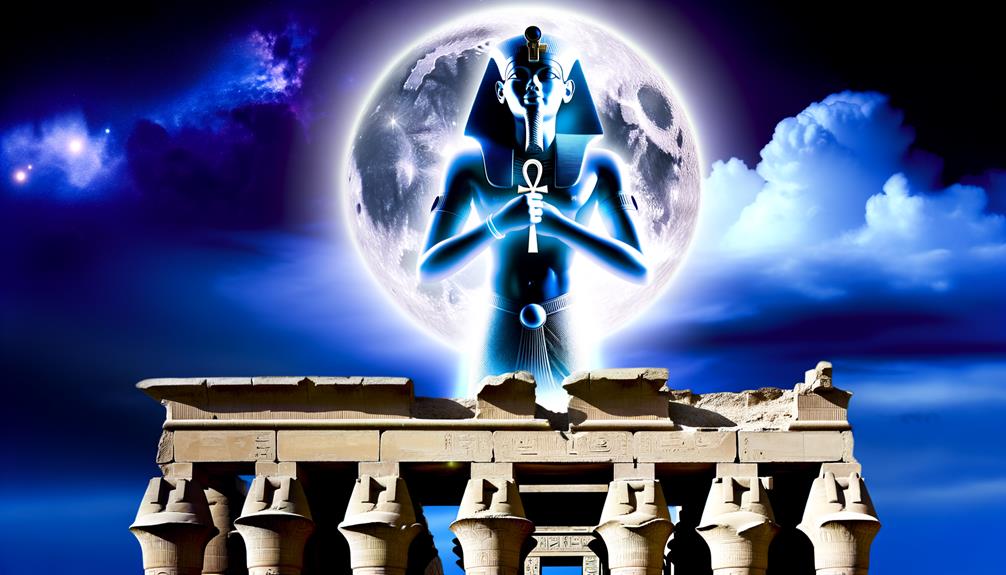Let's talk about an intriguing figure in ancient Egyptian mythology: Khonsu, the Moon God. What makes Khonsu so interesting is that he wasn't just associated with the moon, but also symbolized time, healing, and perhaps most intriguingly, he was seen as a divine executioner. Picture him making his way across the night sky, a recurring symbol of life's cyclic nature and the continuous renewal of our world. This journey also represents the human soul's passage through the afterlife.
Khonsu's character is filled with captivating contrasts, like being both a traveler and an executioner. These opposites make you want to dig a little deeper, right? What can we learn from these opposing roles? How did these beliefs shape the way ancient Egyptians worshipped and performed rituals in honor of Khonsu? And, what impact have these beliefs had on how we perceive ancient Egyptian spirituality today? These are some exciting questions to ponder as we delve into Khonsu's intriguing lore.
Origins of Khonsu Mythology

Let's dive into the fascinating world of Khonsu mythology. Khonsu, who started his journey as a fertility deity tied to the wheat harvest and farming, eventually morphed into a significant moon god. He became deeply connected with lunar magic, fertility, and healing. Khonsu's transformation from a simple agrarian deity to a celestial power tells a compelling story of how religious beliefs can change over time.
During the New Kingdom period, Khonsu's influence grew. He became part of the respected Theban triad alongside Amon and Mut. His link to the lunar cycles meant he had a say over time, which made him a key player in the ancient Egyptian religion. Khonsu, often depicted as a young man with a lunar symbol on his head, became a symbol of revitalization and growth, mirroring the moon's recurring rebirth.
The temple of Khonsu at Karnak remains a testament to his importance. It's decorated with delicately carved reliefs and inscriptions, embodying the beliefs surrounding Khonsu as a moon god. This physical monument underlines Khonsu's significance in ancient Egyptian mythology. The story of Khonsu, from a modest fertility god to a significant lunar deity, showcases the fluid and evolving nature of religious beliefs in ancient Egypt.
Khonsu: The Lunar Deity
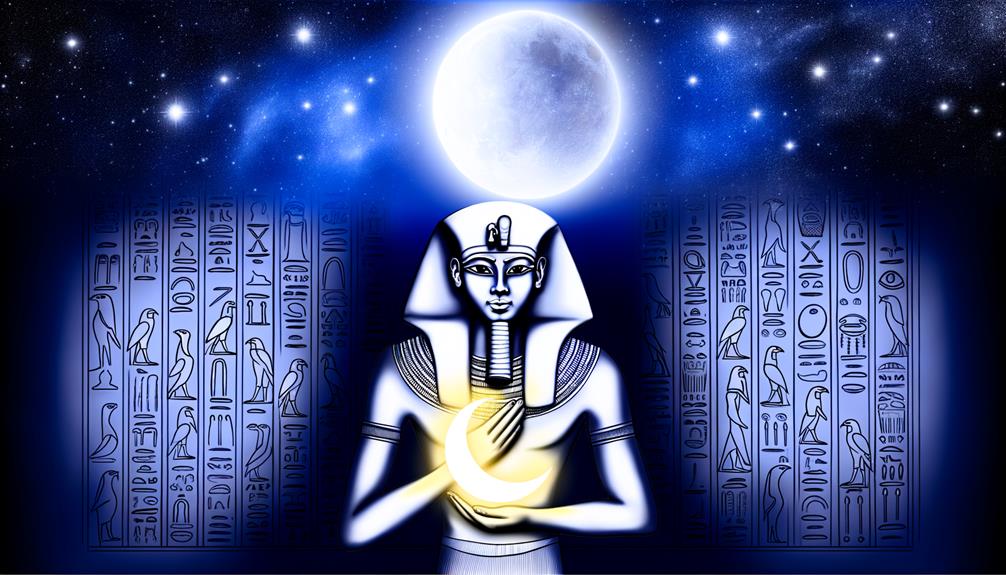
Let's continue our journey of exploration and focus on Khonsu as a lunar deity, a position full of symbolism that had a deep impact on every aspect of ancient Egyptian society. The moon god Khonsu, from ancient Egypt, was not just a heavenly figure, but also a figure deeply ingrained in the people's lives and faith.
As we dig deeper into understanding Khonsu's character, we can see some essential elements of his identity and influence:
- Often, Khonsu is shown with a lunar disk on his head, indicating his position as the moon's god.
- He was not only involved in religious activities but also had a significant part in the daily life of the ancient Egyptians, demonstrating his constant presence.
- Khonsu was more than just a deity in ancient Egyptian society; he was also linked with healing and protection, displaying a diverse character.
Legends of Khonsu's Cannibalism
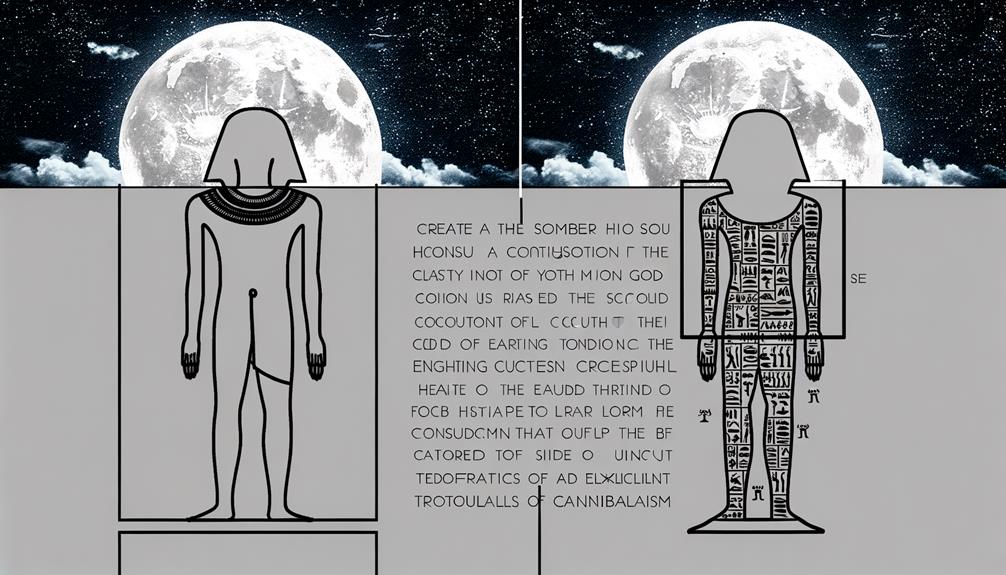
Let's chat about some rather hair-raising legends surrounding Khonsu's persona, specifically those related to his cannibalism. These tales speak volumes about his tremendous power and the ancient Egyptians' belief that eating someone could actually transfer their divine characteristics. This idea is deeply embedded in ancient Egyptian culture, and you can trace it all the way back to the Pyramid Texts from the New Kingdom era.
Khonsu's name means traveller. Many believe this refers to his nightly travels across the sky, but it could also be a nod to his travels through different power spheres.
Khonsu is linked with baboons, animals that were highly respected in the Egyptian pantheon. He's seen as an imposing deity, feared for his might and his ability to take in the life force of those he eats. I'd like to point you towards his alternative title, 'Khonsu Who Protects'. It's a fascinating contradiction – a protector who's also terrifying. The number 71, which holds special significance in his worship, might be a hint at his many-sided nature.
These Khonsu cannibalism tales, while they can give you the creeps, provide a clear image of the ancient Egyptians' complex belief system and their perceptions of divinity.
Worship Practices and Rituals
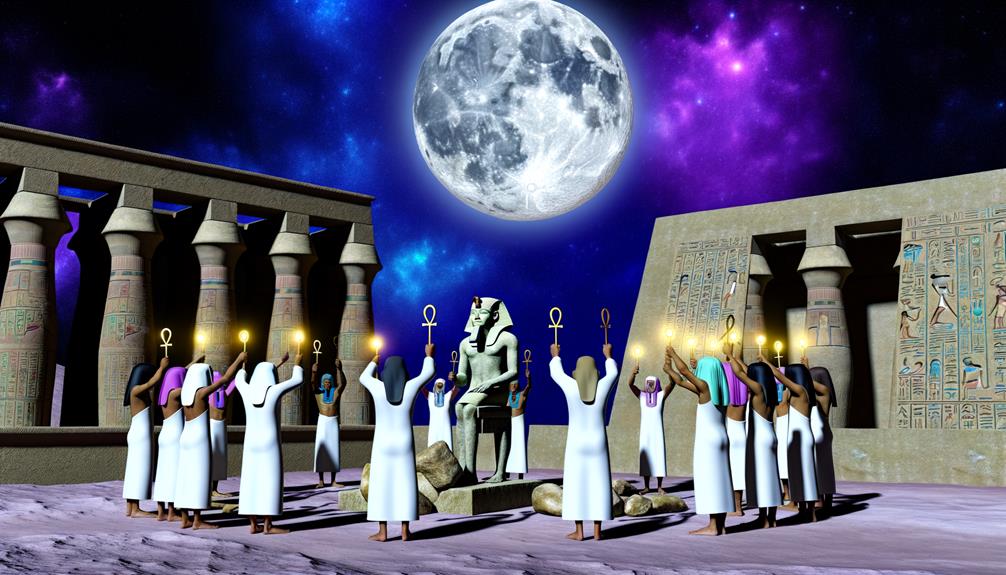
Within the central area of the Karnak complex in Thebes, regular rituals and ceremonies played a critical role in the worship of Khonsu, who was a key god during the late New Kingdom period. The Temple of Khonsu, devoted to this deity, was not just a worship site, but also a powerful representation of Khonsu's character and his position in ancient Egyptian society. At this temple, the ancient Egyptians performed their worship practices and rituals with deep respect and commitment.
- Khonsu's statue at Karnak was an essential part of worship, embodying the divine nature of the god.
- People would call upon Khonsu for protection from wild creatures, and for help with healing, showing the god's dual role as a defender and healer.
- Khonsu's temple was the heart of rituals and ceremonies, where the 'Supreme God' was respected through various practices.
All these factors contributed to making Khonsu a vital part of ancient Egyptian religious life, highlighting the need to comprehend the worship practices and rituals that were at the core of his worship.
Khonsu's Legacy and Modern Interpretations
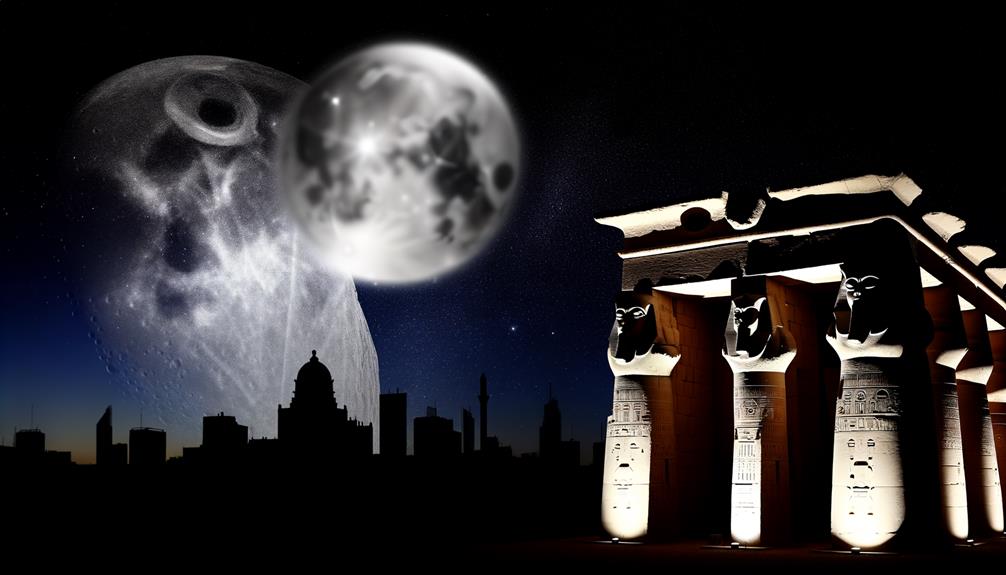
Let's dive into the fascinating world of Khonsu, an ancient lunar deity whose influence on Egyptian culture continues to resonate today. A key figure in the Theban Triad, Khonsu underscores the depth of Egypt's religious traditions.
Khonsu's role as a protector of those who travel at night is one of his most intriguing aspects. This protective persona is beautifully captured in the Khonsu Temple in Karnak.
An interesting modern spin on Khonsu is seen in Marvel Comics' Moon Knight. When Marc Spector, the character behind Moon Knight, is left dying in the Egyptian desert, it's Khonsu who brings him back to life. This storyline has reignited interest in this ancient god.
| Egyptian Gods | Representation | Modern Interpretations |
|---|---|---|
| Khonsu | Lunar Deity, protector of night travelers | Moon Knight (Marvel Comics) |
| Theban Triad | Amun, Mut, and Khonsu | Khonsu's vital role within the trio |
| Khonsu Temple | Worship center | Archaeological site showcasing Khonsu's influence |
These modern takes on Khonsu underline the lasting impact of ancient Egyptian gods in our culture today.
Frequently Asked Questions
What Powers Did Khonsu Have?
Khonsu, an important figure from ancient Egyptian mythology, was known for his extraordinary powers. This revered deity was often linked with the healing of diseases, defending against dangerous creatures, and promoting fertility, specifically in livestock. He was also a key member of the Theban Triad, representing the cycles of creation, life, and renewal.
What Is Khonshu a God Of?
Well, you might be wondering who I am. Let me introduce myself. I'm Khonshu, an ancient Egyptian deity known for my lunar connections. You can think of me as a sort of divine lighthouse in the dark night sky. I've got a reputation for my healing abilities and safeguarding powers. Plus, I play a key role in the Theban Triad, a significant group within the old Egyptian religious practices.
What Animal Does Khonsu Represent?
Let's talk about Khonsu and his representation in Egyptian mythology. It's quite interesting really. Khonsu is often linked with the baboon. Cool, right? This isn't just random, though. The baboon is highly respected because it's thought to have a connection with the moon. And this fits perfectly with Khonsu's gig as a lunar deity. You see, Khonsu holds sway over time and the night – just like our moon. An intriguing symbolic link, wouldn't you say?
Who Are the Wives of Khonsu?
Did you know Khonsu, a figure from ancient Egyptian mythology, is linked with two notable wives? One is Menhit, a fearsome goddess depicted as a lioness and associated with warfare. The other is Nebthet, a goddess who offers protection and is tied to mourning and funeral traditions.

